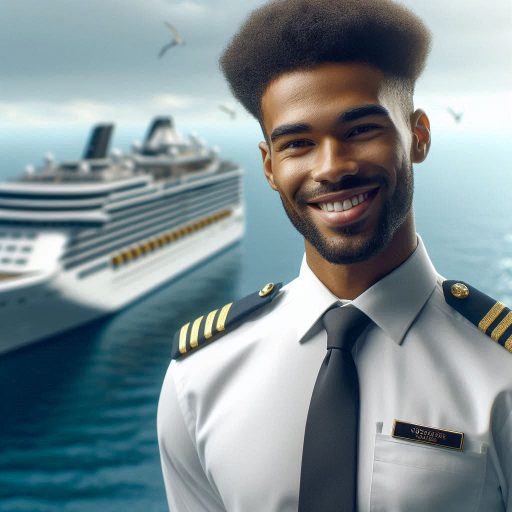Introduction
The cruise ship industry is a booming sector that provides unique career opportunities for individuals.
Working on a cruise ship is not just a job; it’s a lifestyle.
With various roles available onboard, staff members play essential roles in ensuring the smooth operation of the ship and providing top-notch services to guests.
Career progression opportunities are crucial for cruise ship staff as they allow individuals to grow professionally, advance their skills, and climb the career ladder within the industry.
Entry-level positions on a cruise ship
Description of common entry-level positions
Entry-level positions on a cruise ship typically include roles such as waiter, housekeeper, and deckhand.
These roles are essential for the daily operations and guest experience on board.
Skills and qualifications required for these roles
Depending on the specific position, skills such as customer service, communication, attention to detail, and physical stamina are essential.
Qualifications may vary, but most roles require a high school diploma or equivalent.
Advantages of starting at an entry-level position
Starting at an entry-level position on a cruise ship can be a great way to gain valuable experience in the hospitality industry.
It allows individuals to learn the ins and outs of working on a ship, develop transferable skills, and network with other professionals in the industry.
Read: Challenges of Cruise Ship Jobs: What to Expect
Types of Career Progression Opportunities Available
When it comes to working on a cruise ship, there are various career progression opportunities available for staff members.
These opportunities not only allow individuals to advance in their chosen field but also explore new areas of the cruise industry.
Promotion within the Same Department
One of the common ways cruise ship staff can progress in their careers is through internal promotions within the same department.
For example, a waiter who consistently demonstrates excellent customer service skills and leadership qualities may be promoted to a head waiter.
This allows individuals to take on more responsibilities and leadership roles within their area of expertise.
Transitioning to a Different Department
Another exciting opportunity for career progression is transitioning to a different department within the cruise ship.
Staff members who are interested in exploring different areas of the industry can switch departments, such as moving from housekeeping to entertainment.
This not only provides a chance to learn new skills but also broadens their knowledge of the cruise industry as a whole.
Training Programs and Certifications
Cruise lines often offer training programs and certifications to help their staff advance in their careers.
Transform Your Career Today
Unlock a personalized career strategy that drives real results. Get tailored advice and a roadmap designed just for you.
Start NowThese programs may include specialized training in areas such as hospitality management, culinary arts, or event planning.
By completing these programs and obtaining certifications, staff members can enhance their skills and qualifications, opening up new opportunities for career growth and development.
Overall, the cruise ship industry provides a range of career progression opportunities for staff members looking to advance in their careers.
Whether through internal promotions, transitioning to different departments, or participating in training programs, there are plenty of avenues for individuals to grow and excel in their roles on board.
Read: Step-by-Step Guide to Becoming a Licensed Barber
Benefits of Career Progression for Cruise Ship Staff:
As a cruise ship staff member, there are numerous benefits that come with career progression.
These benefits not only enhance the individual’s professional growth but also contribute to their overall job satisfaction and well-being.
Increased Responsibility and Leadership Opportunities
With career progression, cruise ship staff members are given the opportunity to take on more responsibilities.
This allows them to showcase their skills and capabilities, leading to further career growth.
Being entrusted with leadership roles also helps in developing crucial leadership skills.
Higher Salary and Better Benefits
One of the most attractive aspects of career progression is the prospect of a higher salary.
As cruise ship staff move up the ranks, their salaries increase to reflect their added responsibilities.
Additionally, better benefits such as healthcare coverage and retirement plans may become available.
Enhanced Job Satisfaction and Morale
Advancing in one’s career within the cruise ship industry often leads to a greater sense of job satisfaction.
As staff members see their hard work paying off through promotions, they feel more valued and appreciated.
Greater job satisfaction, in turn, boosts morale and overall happiness in the workplace.
In fact, career progression for cruise ship staff brings a host of benefits ranging from increased responsibility and leadership opportunities to higher salary and better benefits.
It not only contributes to professional growth but also enhances job satisfaction and morale among staff members.
Read: Benefits of Working on a Cruise Ship: Perks and Pay

Tips for Advancing in a Cruise Ship Career
Advancing in a cruise ship career requires strategic effort and focus.
Transform Your Career Today
Unlock a personalized career strategy that drives real results. Get tailored advice and a roadmap designed just for you.
Start NowBy following these tips, you can increase your chances of success and progress in the industry.
Demonstrate strong work ethic and dedication
Maintaining a solid work ethic is key to standing out in the fast-paced cruise ship environment.
Employers value employees who consistently show dedication and go the extra mile.
Punctuality, reliability, and willingness to take on additional tasks are essential.
By staying focused and producing high-quality work, you will become a valuable asset to the team.
Seek feedback and actively participate in training programs
Actively seeking feedback from supervisors helps you understand areas where you can improve.
This shows initiative and a desire for personal growth.
Cruise ships offer various training programs to improve your skills.
By attending these programs, you demonstrate your commitment to growing professionally.
Continuous learning ensures you stay updated on best practices and industry standards.
Network with colleagues and supervisors for mentorship opportunities
Building a strong professional network on a cruise ship can help open doors for career advancement.
Connecting with colleagues and supervisors allows you to gain insights into different roles and career paths.
Seeking mentorship from more experienced staff members provides guidance and support.
Mentors can share valuable advice and help you navigate your career journey.
In a nutshell, advancing in a cruise ship career requires hard work, continuous learning, and networking.
By demonstrating a strong work ethic, seeking feedback, and building relationships, you can position yourself for future opportunities and success.
Read: Tips for Building a Loyal Clientele as a Stylist
Uncover the Details: Advancement Opportunities for Recreation Workers
Find Out More: Top Apps and Tools for Bus Drivers on the Job
Real-life success stories of cruise ship staff
Working on a cruise ship offers endless opportunities for career growth and personal development.
Transform Your Career Today
Unlock a personalized career strategy that drives real results. Get tailored advice and a roadmap designed just for you.
Start NowMany individuals have started at entry-level positions and have worked their way up the ranks through hard work, dedication, and perseverance.
Here are some inspiring success stories of cruise ship staff members who have achieved great success in their careers:
Profile 1: Sarah Smith, Cruise Director
- Started as a social hostess
- Faced challenges of long hours and homesickness
- Overcame challenges by staying focused on her goals
- Received promotions due to her excellent work ethic
- Currently, a successful Cruise Director
Lessons learned
Sarah emphasizes the importance of perseverance and maintaining a positive attitude, even in challenging situations.
She advises aspiring cruise ship staff to set clear goals and work hard towards achieving them.
Profile 2: John Johnson, Executive Chef
- Started as a line cook
- Faced challenges of adapting to a fast-paced environment
- Overcame challenges by seeking mentorship from senior chefs
- Promoted to sous chef and eventually became an Executive Chef
Lessons learned
John learned the importance of continuous learning and seeking guidance from experienced professionals.
He encourages aspiring cruise ship staff to be proactive in seeking opportunities for growth and development.
Profile 3: Maria Rodriguez, Guest Relations Manager
- Started as a receptionist
- Faced challenges of language barriers and cultural differences
- Overcame challenges by taking language courses and cultural training
- Promoted to Guest Relations Manager for her exceptional customer service skills
Lessons learned
Maria stresses the importance of adaptability and continuous self-improvement.
She advises aspiring cruise ship staff to embrace diversity and seek opportunities to learn about different cultures to better serve guests.
These real-life success stories of cruise ship staff members demonstrate that with determination, hard work, and a positive attitude, it is possible to achieve significant career progression in the cruise industry.
Aspiring cruise ship staff can learn valuable lessons from these individuals and apply them to their own career journeys.
Importance of continuous learning and professional development
Opportunities for further education and certifications while working on a cruise ship
Continuous learning and professional development are crucial for cruise ship staff to advance in their careers.
Working on a cruise ship offers unique opportunities for further education and obtaining certifications in various fields.
By taking advantage of these opportunities, staff can enhance their skills and knowledge, making them more valuable to their employers.
How ongoing training can help staff stay competitive in the industry
Ongoing training is essential in the fast-paced cruise industry, where new technologies and trends constantly emerge.
Regular training sessions help staff stay competitive, ensuring they can meet the evolving needs of guests and the industry.
Comparison of on-the-job training versus formal education for career progression
While on-the-job training is valuable, formal education can provide a more structured approach to career progression.
Formal education can offer in-depth knowledge and a broad perspective that on-the-job training may not provide.
Combining on-the-job training with formal education can be an effective way for staff to enhance their skills and advance their careers.
Overall, continuous learning and professional development play a vital role in the career progression of cruise ship staff.
Conclusion
Working on a cruise ship offers a variety of career progression opportunities.
Transform Your Career Today
Unlock a personalized career strategy that drives real results. Get tailored advice and a roadmap designed just for you.
Start NowEmployees can move up from entry-level positions to managerial roles.
Cruise lines often provide training programs for staff to enhance their skills.
Staff can transition to departments like entertainment, guest services, or food and beverage.
Opportunities for learning new skills to diversify one’s expertise.
Working on international waters exposes staff to diverse cultures and boosts their resume.
[E-Books for Sale]
The Big Book of 500 High-Paying Jobs in America: Unlock Your Earning Potential
$19.99 • 500 High-Paying Jobs • 330 pages
Explore 500 high-paying jobs in America and learn how to boost your career, earn more, and achieve success!
See All 500 High-Paying Jobs of this E-Book
1001 Professions Without a Degree: High-Paying American Jobs You Can Start Now
$19.99 • 1001 Professions Without a Degree • 174 pages
Discover 1001 high-paying jobs without a degree! Unlock career tips, skills, and success strategies for just $19.99!




